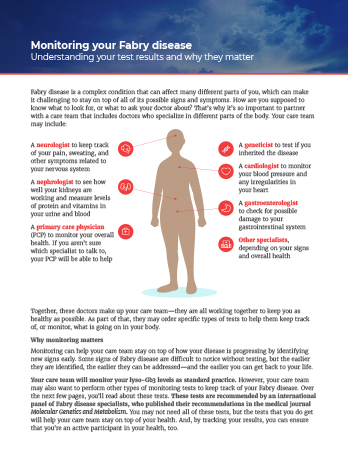Keep track of your Fabry symptoms and take charge of your health
Because Fabry disease symptoms vary so much from one person to the next, it’s important to keep track of any changes in your body and talk to your doctors about them, even if you aren’t feeling those changes on the day of your appointment. Here are tools that can help:
Daily Fabry Symptom Tracker Checklist
This symptom tracker checklist can help you stay on top of your daily symptoms. It lists specific symptoms you may experience, organized by where they occur in your body. There’s also a place to note any additional symptoms you may be experiencing.
Fabry Doctor Dialogue Guide
This guide can help you decide which doctor to talk to and what to ask about Fabry disease and its treatment.
Working with your care team proactively
When you’re first diagnosed, it’s important to find a primary care doctor who understands Fabry disease and has experience treating people with the disease. They will play a key role in communicating with the other doctors on your team.
As Fabry disease progresses, you can experience new symptoms or worsening ones. Talk with your doctor if symptoms are becoming more intense or frequent, so you can determine which strategies work for you. The earlier you mention new or worsening symptoms to your doctor, the earlier your doctor can help you manage them.
Annual Fabry Monitoring Guide
This guide will help you monitor your test results to help you and your care team stay on top of your disease progression.
Watch the Video: How to work with your Fabry care team
Understanding how the members of your Fabry care team can help you
Fabry disease can affect many different parts of your body, making it hard to stay on top of all of its possible signs and symptoms. How are you supposed to know what to look for or what to ask your doctor about?
That’s why it’s important to partner with a care team that includes doctors who specialize in different parts of the body. Your care team may include:
Nervous System
A neurologist to keep track of your pain, sweating, and other symptoms related to your nervous system
Kidneys
A nephrologist to see how well your kidneys are working and measure levels of protein and vitamins in your urine and blood
Primary Care
A primary care doctor to monitor your overall health. If you aren't sure which specialist to talk to, your primary care doctor will be able to help
DNA
A geneticist to test if you inherited the disease
Heart
A cardiologist to monitor your blood pressure and any irregularities in your heart
Digestive System
A gastroenterologist to check for possible damage to your gastrointestinal (GI) system
Specialty Care
Other specialists, depending on your signs and symptoms and overall health


A
A
A
A
A
A
Other

Together, these doctors make up your care team—working together to keep you as healthy as possible. They may order specific types of tests to help them keep track of what’s going on in your body.
Watch the Video: How to stay on top of your Fabry treatment
Reevaluate your treatment from time to time. Being honest with your doctors about any continued symptoms and side effects will help make sure your treatment plan truly works for you.
Watch the Webinar Video: Understanding the road ahead with Fabry disease
Understanding Fabry disease is the beginning of the journey. As you continue to walk side by side with Fabry disease, you may face surprises. This webinar video will help you understand:
- What Fabry disease is and is not
- The long-term challenges you may face living with Fabry disease
- How learning about Fabry can help you take positive actions
You will hear from a genetic counselor and a patient with Fabry disease who will share their experience, strength, and hope to guide you forward.



EXPLORE FABRY RESOURCES
 US
US EU
EU






